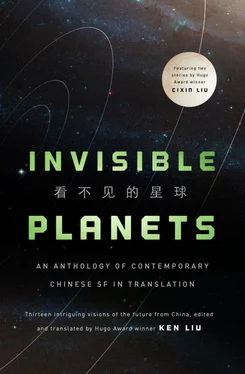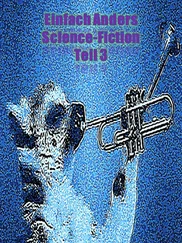In my view, “what if” is at the heart of science fiction. Starting with reality itself, the writer applies plausible and logically consistent conditions to play out a thought experiment, pushing the characters and plot toward an imagined hyperreality that evokes a sense of wonder and estrangement. Faced with the absurd reality of contemporary China, the writer cannot fully explore or express the possibilities of extreme beauty and extreme ugliness without resorting to science fiction.
Since the 1990s, the ruling class of China has endeavored to produce an ideological fantasy through the machinery of propaganda: development (increase in GDP) is sufficient to solve all problems. But the effort has failed and so created even more problems. In the process of this ideological hypnosis of the entire population, a definition of “success” in which material wealth is valued above all has choked off the younger generation’s ability to imagine the possibilities of life and the future. This is a dire consequence of the policy decisions of those born in the 1950s and 1960s, a consequence which they neither understand nor accept responsibility for.
These days, I work as a mid-level manager in one of China’s largest web companies. I’m in charge of a group of young people born after 1985, some even after 1990. In our daily contact, what I sense in them above all is a feeling of exhaustion about life and anxiety for success. They worry about skyrocketing real estate prices, pollution, education for their young children, medical care for their aging parents, growth and career opportunities—they are concerned that as the productivity gains brought about by China’s vast population have all but been consumed by the generation born during the 1950s–1970s, they are left with a China plagued by a falling birthrate and an aging population, in which the burdens on their shoulders grow heavier year after year and their dreams and hopes are fading.
Meanwhile, the state-dominated media are saturated with phrases like “the Chinese Dream,” “revival of the Chinese people,” “the rise of a great nation,” “scientific development”… Between the feeling of individual failure and the conspicuous display of national prosperity lies an unbridgeable chasm. The result is a division of the population into two extremes: one side rebels against the government reflexively (sometimes without knowing what its “cause” is) and trusts nothing it says; the other side retreats into nationalism to give itself the sense of mastering its own fate. The two sides constantly erupt into flame wars on the Internet, as though this country can hold only One True Faith for the future: things are either black or white; either you’re with us, or you’re against us.
If we pull back far enough to view human history from a more elevated perspective, we can see that society builds up, invents, creates utopias—sketches of perfect, imagined futures—and then, inevitably, the utopias collapse, betray their ideals, and turn into dystopias. The process plays out in cycle after cycle, like Nietzsche’s eternal recurrence.
“Science” is itself one of the greatest utopian illusions ever created by humankind. I am by no means suggesting that we should take the path of antiscience—the utopia offered by science is complicated by the fact that science disguises itself as a value-neutral, objective endeavor. However, we now know that behind the practice of science lie ideological struggles, fights over power and authority, and the profit motive. The history of science is written and rewritten by the allocation and flow of capital, favors given to some projects but not others, and the needs of war.
While micro fantasies burst and are born afresh like sea spray, the macro fantasy remains sturdy. Science fiction is the byproduct of the process of gradual disenchantment with science. The words create a certain vision of science for the reader. The vision can be positive or full of suspicion and criticism—it depends on the age we live in. Contemporary China is a society in the transition stage when old illusions have collapsed but new illusions have not yet taken their place; this is the fundamental cause of the rips and divisions, the confusion and the chaos.
In 1903, another revolutionary time in Chinese history when the new was replacing the old, Lu Xun, the father of modern Chinese literature, said, “The progress of the Chinese people begins with scientific fiction.” He saw science fiction as a tool to inspire the nation with the spirit of science and to chase away the remnants of feudal obscurantism. More than a hundred years later, the problems facing us are far more complicated and likely not amenable to scientific solutions, but I still believe that science fiction is capable of wedging open small possibilities: to mend the torn generation, to allow different visions and imagined future Chinas to coexist in peace, to listen to one another, to reach consensus, and to proceed together.
Even if it’s only an insignificant, slow, hesitant step.
WHAT MAKES CHINESE SCIENCE FICTION CHINESE?
by Xia Jia
In the summer of 2012, I was on a panel on Chinese science fiction at Chicon 7. One of the attendees asked me and the other Chinese authors: “What makes Chinese science fiction Chinese?”
This is not at all an easy question to answer, and everyone will have a different response. It is true, however, that for the last century or so, “Chinese science fiction” has occupied a rather unique place in the culture and literature of modern China.
Science fiction’s creative inspirations—massive machinery, new modes of transportation, global travel, space exploration—are the fruits of industrialization, urbanization, and globalization, processes with roots in modern capitalism. But when the genre was first introduced via translation to China at the beginning of the twentieth century, it was mostly treated as fantasies and dreams of modernity, material that could be woven into the construction of a “Chinese Dream.”
“Chinese Dream” here refers to the revival of the Chinese nation in the modern era, a prerequisite for realizing which was reconstructing the Chinese people’s dream. In other words, the Chinese had to wake up from their five-thousand-year-old dream of being an ancient civilization and start to dream of becoming a democratic, independent, prosperous modern nation-state. As a result, the first works of science fiction in Chinese were, in the word of the famous writer Lu Xun, seen as literary tools for “improving thinking and assisting culture.” On the one hand, these early works, as myths of science, enlightenment, and development based on imitating “the West”/“the world”/“modernity,” attempted to bridge the gap between reality and dream. On the other hand, the limitations of their historical context endowed them with deeply Chinese characteristics that only emphasized the depth of the chasm between dream and reality.
One such early work was Lu Shi’e’s “New China” (published in 1910). The protagonist wakes up in the Shanghai of 1950 after a long slumber. He sees around him a progressive, prosperous China, and is told that all this is due to the efforts of a certain Dr. Su Hanmin, who had studied abroad and invented two technologies: “the spiritual medicine” and “the awakening technique.” With these technologies, a population mired in spiritual confusion and the daze of opium awakened in an instant and began an explosive bout of political reform and economic development. The Chinese nation has not only been revived, but is even able to overcome abuses which the West could not overcome on its own. In the author’s view, “European entrepreneurs were purely selfish and cared not one whit for the suffering of others. That was why they had stimulated the growth of the Communist parties.” However, with the invention of Dr. Su’s spiritual medicine, every Chinese has become altruistic, and “everyone views everyone else’s welfare as their responsibility; it is practically socialism already, and so of course we’re not plagued by Communists.”
Читать дальше












